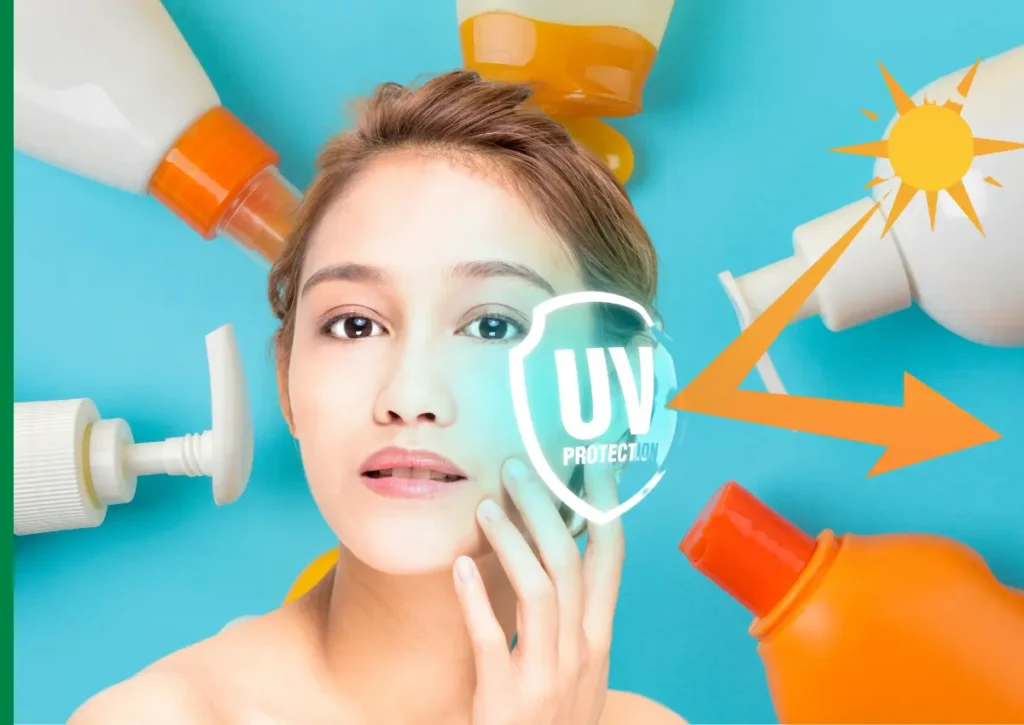Summer is a serious season. I found out myself how important this lesson is after my first rainy day when I ignored applying sunscreen due to the clouds. If you are looking for sun protection products, which will have the best availability come 2025?
This deeply researched insight clearly explains all the essential points—for example, choosing the best dermatologist-approved sunscreen for skin—and tells you about SPF. Choose a sun protection brand that works for your kind of skin so you can safely face UV rays, pollution and signs of early aging all through the year.

What Is the Purpose of Daily Sunscreen?
I know many of us still imagine sunscreen as something needed only when we go to a beach or a hill station. That UV index in India stays at ‘extreme’ levels much of the time and you’re still getting exposed if you’re stuck in traffic or sitting by an office window.
The immediate benefits you’ll notice:
- No more painful sunburns after a day out
- Prevention of unwanted tanning
- Less heat-related skin irritation
- Protection from pollution damage
The long-term payoff (your future self will thank you):
- Significantly reduced risk of skin cancer
- Prevention of dark spots and melasma
- Slower skin aging process
- More even skin tone
For Indian skin, which tends to be more prone to hyperpigmentation, consistent sunscreen use isn’t just recommended—it’s essential for maintaining healthy, even-toned skin.
Chemical vs Physical Sunscreens
Chemical Sunscreens
Imagine chemical sunscreens as protectors inside your skin. They intercept UV rays and make them into harmless heat. Major chemicals found in this type are avobenzone, oxybenzone and octocrylene.
Pros:
- Lightweight, no-white-cast formula
- Blends seamlessly into all skin tones
- Often comes with additional skincare benefits
Cons:
- Takes 20-30 minutes to activate
- May irritate sensitive skin
- Some ingredients raise environmental concerns
Physical Sunscreens
When you use a physical sunscreen, it’s like there is a thin umbrella layer protecting your skin cells. Zinc oxide and titanium dioxide form a layer that physically repels UV radiation.
Pros:
- Immediate protection upon application
- Gentle on sensitive skin
- Safe for pregnant women and children
- Environmentally friendly
Cons:
- Potential for white cast (though modern formulas have improved significantly)
- Can feel heavier on the skin
What Makes a Great Sunscreen for Indian Conditions?
1. Broad-Spectrum Protection is Non-Negotiable
Always check the ingredient list for this phrase on each bottle. The addition of “broad-spectrum” ensures your sunscreen covers protection against UVA rays (aging rays) and UVB rays (burning rays). Not having it means you are missing out on half of the protection you should have.
2. SPF 30 Minimum, SPF 50 Preferred
While SPF 15 blocks 93% of UVB rays, SPF 30 blocks 97%, and SPF 50 blocks 98%. Given India’s intense sun exposure, especially during summer months, SPF 30 should be your minimum, with SPF 50 being ideal for comprehensive protection.
3. Know Your Skin Type
- Oily skin: Look for gel-based or lightweight formulas
- Dry skin: Choose moisturizing formulations with hyaluronic acid
- Sensitive skin: Opt for physical sunscreens with minimal additives
- Acne-prone skin: Non-comedogenic formulas are your best friend.
Top 10 best Sunscreens in 2025
1. Dr. Sheth’s Ceramide & Vitamin C Sunscreen SPF 50+
Best for: Sensitive skin and barrier repair
With its pharmaceutical strength, this formula can do many important jobs. Ceramides reinforce your skin barrier and vitamin C helps protect against free radicals and makes your skin brighter. It is made for Indian skin and shields it from UV rays, pollution and blue light.
Why it stands out: The combination of barrier repair and sun protection makes it perfect for compromised or sensitive skin.
2. Cetaphil Sun SPF 50 Very High Protection Light Gel
Best for: Oily and acne-prone skin
For people who hate anything heavy or greasy on their skin, this gel-based formula is a real advantage. Zinc oxide protects from UVA, UVB and infrared radiation, and being water-resistant makes it convenient for India’s weather.
Key features:
- Hypoallergenic
- Won’t clog pores
- Non-greasy formula
- Preservative-free
3. Nourish Mantra Ray Rescue Sunscreen SPF 50
Best for: Multi-functional skincare
This isn’t only sunscreen; it also provides full skincare benefits. Those with sensitive or oily skin will benefit most from hyaluronic acid for moisture, aquaxyl to retain skin moisture, soothing aloe vera and ashwagandha for adaptogenic reasons.
Standout feature: The ashwagandha extract provides stress-fighting benefits for your skin.
4. Minimalist Sunscreen SPF 50 with Multi-Vitamins
Best for: No-nonsense protection
True to the brand’s philosophy, this formula focuses on effective UV filters enhanced with essential vitamins. It’s lightweight, leaves no white cast, and the multivitamin complex supports overall skin health.
5. Aqualogica Radiance+ Dewy Sunscreen SPF 50
Best for: Summer glow
Perfect for the hot season, this sunscreen combines niacinamide for oil control with watermelon extracts for cooling hydration. The dewy finish gives you that natural, healthy glow while keeping you protected.
6. Neutrogena Ultra Sheer Sunscreen SPF 50+
Best for: Under makeup
A dermatologist’s favorite for its non-comedogenic properties and matte finish. This sunscreen is ideal for minimal shine and maximum wearability under makeup. The lightweight formula makes reapplication throughout the day manageable.
7. The Derma Co Pore Minimizing Priming Sunscreen SPF 50
Best for: Makeup lovers
This innovative dual-purpose product serves as both sunscreen and makeup primer. The inclusion of niacinamide and P-Refinyl helps control excess oil production while minimizing pore appearance.
8. Dot & Key Vitamin C + E Super Bright Sunscreen SPF 50
Best for: Digital protection
The fact that it protects against both blue light and UV rays means it is appropriate for modern lives, mainly because of the time spent on screens. The protections from the sun, along with vitamins C and E, help to block free radicals.
9. Lotus Herbals Safe Sun Invisible Matte Gel SPF 50
Best for: Budget-conscious buyers
Offering excellent value for money, this gel-based sunscreen provides reliable protection with a truly matte finish. Note that it contains fragrances, so those with highly sensitive skin should patch test first.
10. Lakme Sun Expert SPF 30 PA++ Ultra Matte Lotion
Best for: Beginners
While offering SPF 30 protection, this affordable option includes lemongrass and cucumber extracts for oil control and cooling effects. It’s an excellent entry-level choice for those new to daily sunscreen use.
How to use Sunscreen that actually works?
The Quarter Teaspoon Rule
Put about 1/4 teaspoon on your face and neck. It might look overwhelming, but most individuals apply only a small amount compared to the recommended amount, which makes things less safe.
Timing Matters
Put sunscreen on your skin at least 15-20 minutes before going in the sun. Sunscreens of this kind need to be absorbed before they start shielding your skin.
Remember to Plan Selfies at These Places
- Ears (really, they hurt!)
- Lips (make sure to use SPF lip balm)
- The back of your neck
- Sandals call for walking on the toes.
- Applying Early and Regularly Really Helps
After every two hours and also once you’re finished swimming, sweating or have dried off. If you use makeup, using a setting spray or powder sunscreen can be an easy way to keep your sun protection topped up.
Common Sunscreen Mistakes to Make
Only using sunscreen on sunny days Reality: UV rays penetrate clouds and windows. Make it a daily habit.
Applying too little product Reality: Most people use only 25% of the recommended amount.
Forgetting to reapply Reality: Sunscreen wears off, especially in India’s humidity and heat.
Thinking higher SPF means all-day protection Reality: Even SPF 100 needs reapplication every two hours.
Special Considerations for Climate
Monsoon Season
Don’t let cloudy skies fool you. UV rays can penetrate clouds, and the humidity can make skin more sensitive.
Winter Protection
Even in cooler months, UV rays reflect off surfaces and can cause damage. Maintain your sunscreen routine year-round.
Pollution Factor
Many modern sunscreens now include anti-pollution benefits—a must-have for urban Indians dealing with smog and environmental stressors.
Final thoughts
Sunscreen loves your skin no matter the time of year. As India gets plenty of sun and is polluted, daily use of sunscreen is your strongest defense against early skin aging, dark spots and serious health problems. Hustling through a big city or sunbathing on a hill, skipping sunscreen won’t be allowed anymore. Given the wide variety of special-formula sunscreens, finding one that fits your skin type is now simple.
Therefore, quit exposing your skin to harm. Choose smart. Apply generously. Reapply religiously. You can count on the fact that your future you (with healthy and glowing skin) will appreciate it.
FAQs
Can sunscreen remove a tan?
No.
What SPF level is best for Indian summer?
SPF 50 sunscreen is recommended for Indian summers because UV rays are very intense. It is suggested for everyday use because it offers 98% protection against harmful UVB rays.
Should I wear sunscreen even on cloudy or rainy days?
Yes, UV radiation is able to get through clouds and windowpanes. You still need sunscreen when the sun hides behind clouds or it rains heavily to avoid dark spots and early aging.
Can I skip sunscreen if my moisturizer has SPF?
No.
Does sunscreen help with anti-aging?
Yes, Applying sunscreen regularly on the face helps to maintain youthful skin, stop wrinkles and protect the skin’s evenness by guarding against present and future risks from both natural and artificial radiation.



